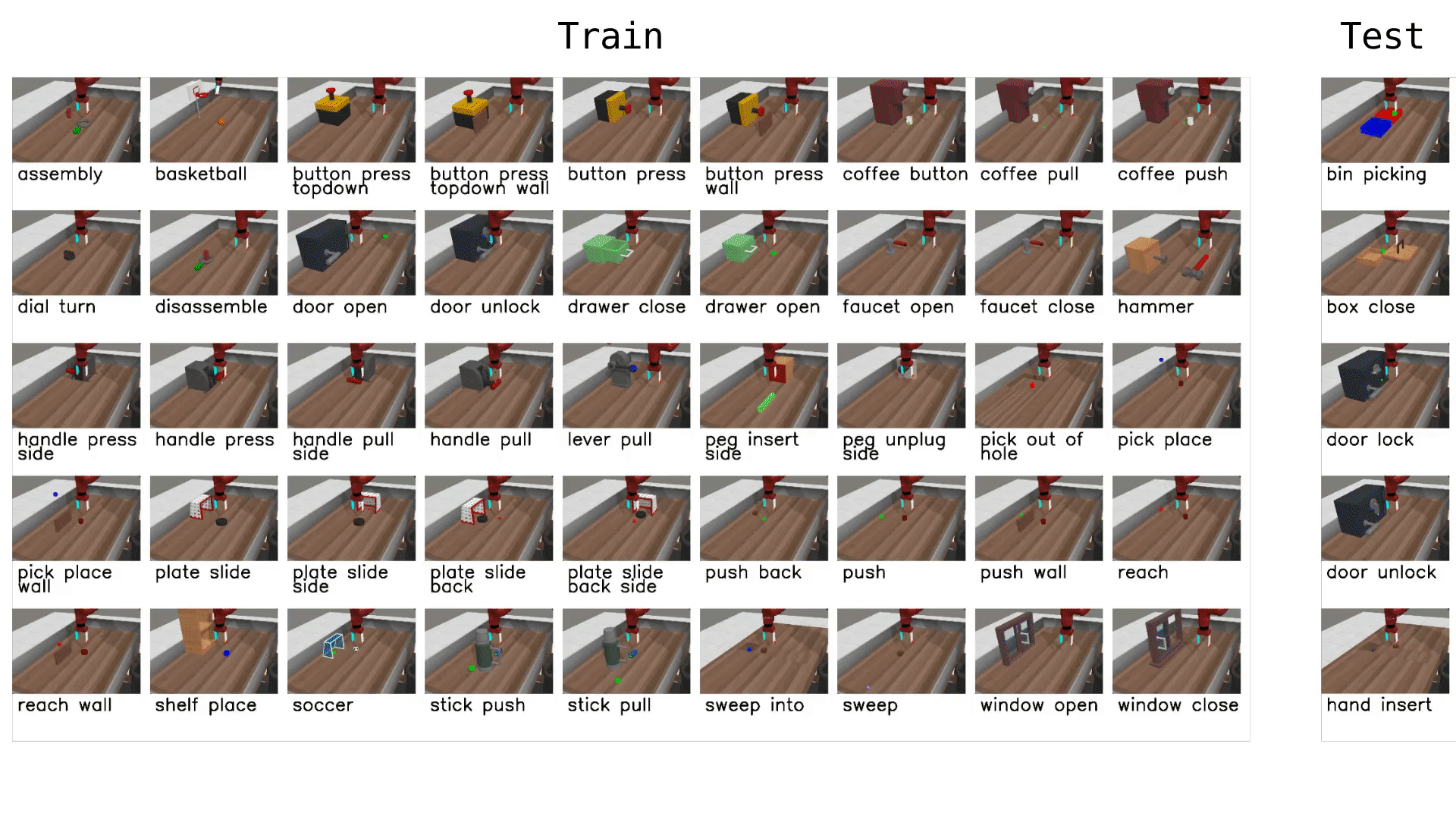LeRobot documentation
Meta-World
Meta-World
Meta-World is a well-designed, open-source simulation benchmark for multi-task and meta reinforcement learning in continuous-control robotic manipulation. It gives researchers a shared, realistic playground to test whether algorithms can learn many different tasks and generalize quickly to new ones — two central challenges for real-world robotics.

Why Meta-World matters
- Diverse, realistic tasks. Meta-World bundles a large suite of simulated manipulation tasks (50 in the MT50 suite) using everyday objects and a common tabletop Sawyer arm. This diversity exposes algorithms to a wide variety of dynamics, contacts and goal specifications while keeping a consistent control and observation structure.
- Focus on generalization and multi-task learning. By evaluating across task distributions that share structure but differ in goals and objects, Meta-World reveals whether an agent truly learns transferable skills rather than overfitting to a narrow task.
- Standardized evaluation protocol. It provides clear evaluation modes and difficulty splits, so different methods can be compared fairly across easy, medium, hard and very-hard regimes.
- Empirical insight. Past evaluations on Meta-World show impressive progress on some fronts, but also highlight that current multi-task and meta-RL methods still struggle with large, diverse task sets. That gap points to important research directions.
What it enables in LeRobot
In LeRobot, you can evaluate any policy or vision-language-action (VLA) model on Meta-World tasks and get a clear success-rate measure. The integration is designed to be straightforward:
We provide a LeRobot-ready dataset for Meta-World (MT50) on the HF Hub:
https://huggingface.co/datasets/lerobot/metaworld_mt50.- This dataset is formatted for the MT50 evaluation that uses all 50 tasks (the most challenging multi-task setting).
- MT50 gives the policy a one-hot task vector and uses fixed object/goal positions for consistency.
Task descriptions and the exact keys required for evaluation are available in the repo/dataset — use these to ensure your policy outputs the right success signals.
Quick start, train a SmolVLA policy on Meta-World
Example command to train a SmolVLA policy on a subset of tasks:
lerobot-train \
--policy.type=smolvla \
--policy.repo_id=${HF_USER}/metaworld-test \
--policy.load_vlm_weights=true \
--dataset.repo_id=lerobot/metaworld_mt50 \
--env.type=metaworld \
--env.task=assembly-v3,dial-turn-v3,handle-press-side-v3 \
--output_dir=./outputs/ \
--steps=100000 \
--batch_size=4 \
--eval.batch_size=1 \
--eval.n_episodes=1 \
--eval_freq=1000Notes:
--env.taskaccepts explicit task lists (comma separated) or difficulty groups (e.g.,env.task="hard").- Adjust
batch_size,steps, andeval_freqto match your compute budget. - Gymnasium Assertion Error: if you encounter an error like
AssertionError: ['human', 'rgb_array', 'depth_array']when running MetaWorld environments, this comes from a mismatch between MetaWorld and your Gymnasium version. We recommend using:
pip install "gymnasium==1.1.0"to ensure proper compatibility.
Quick start — evaluate a trained policy
To evaluate a trained policy on the Meta-World medium difficulty split:
lerobot-eval \
--policy.path="your-policy-id" \
--env.type=metaworld \
--env.task=medium \
--eval.batch_size=1 \
--eval.n_episodes=2This will run episodes and return per-task success rates using the standard Meta-World evaluation keys.
Practical tips
- If you care about generalization, run on the full MT50 suite — it’s intentionally challenging and reveals strengths/weaknesses better than a few narrow tasks.
- Use the one-hot task conditioning for multi-task training (MT10 / MT50 conventions) so policies have explicit task context.
- Inspect the dataset task descriptions and the
info["is_success"]keys when writing post-processing or logging so your success metrics line up with the benchmark.